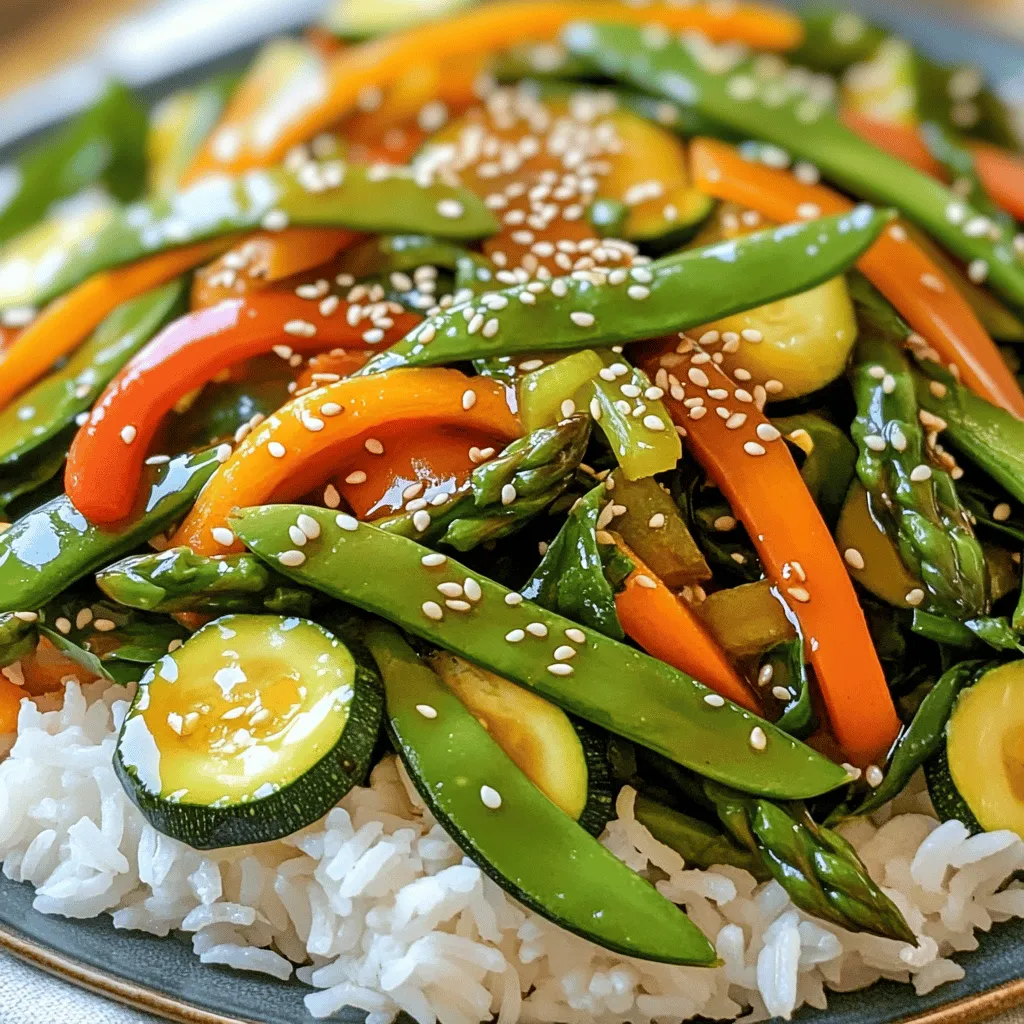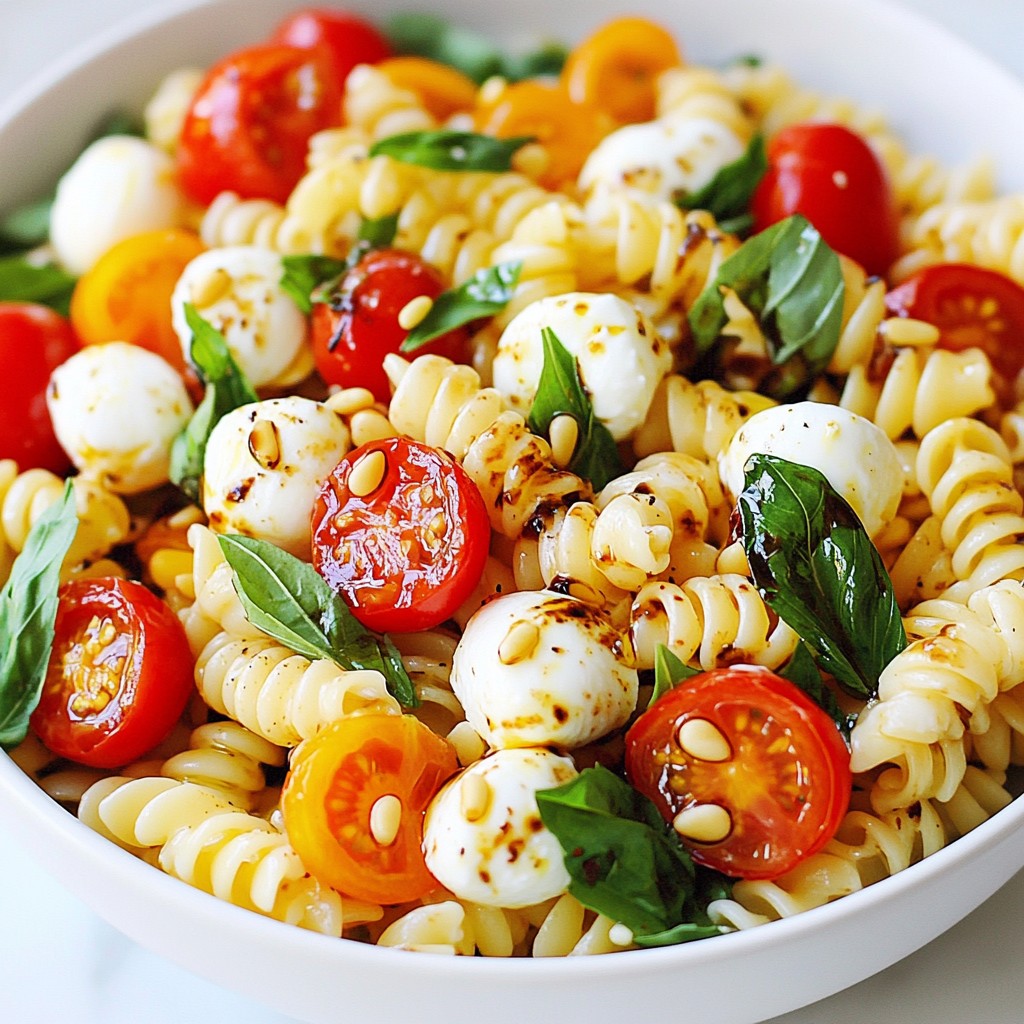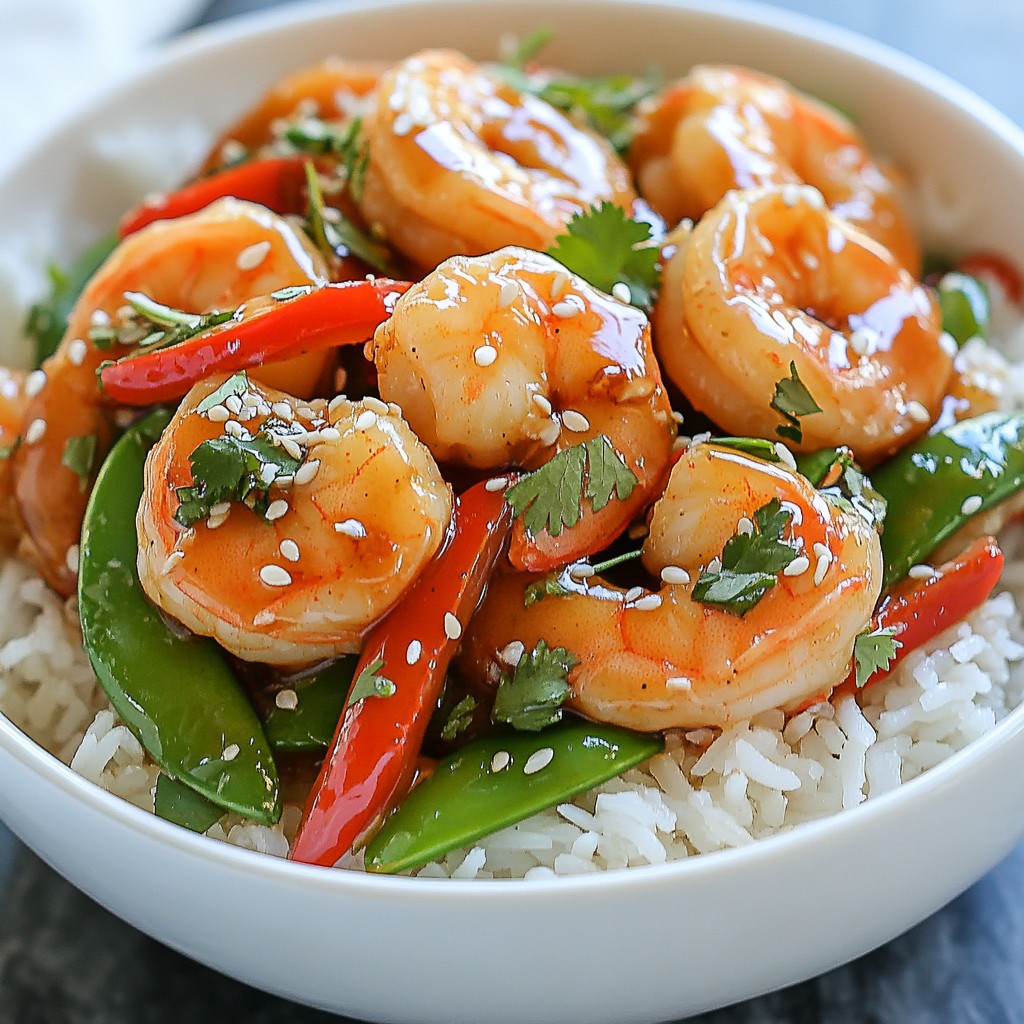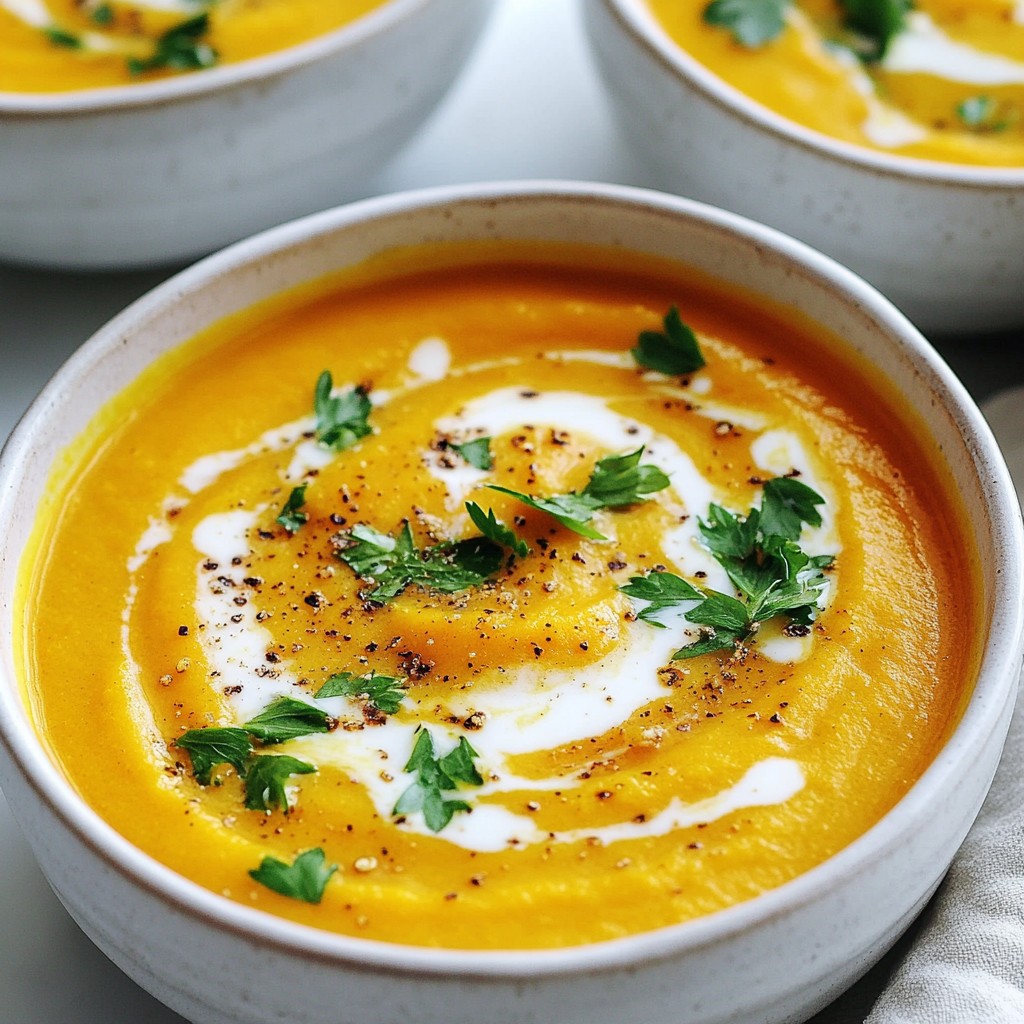Spring is here, and it’s the perfect time to whip up a vibrant Spring Vegetable Stir-Fry! Packed with fresh veggies, this dish is flavorful and nutritious. I’ll guide you through selecting the best spring vegetables, using essential seasonings, and perfecting your cooking technique. Whether you want a quick meal or a heartier option, this stir-fry can be tailored to your taste. Let’s dive in and create a dish that bursts with spring flavor!
Ingredients
List of Fresh Spring Vegetables
For a vibrant spring vegetable stir-fry, use these fresh spring vegetables:
– 1 cup snap peas, trimmed
– 1 bell pepper (red or yellow), sliced
– 1 zucchini, sliced into half-moons
– 1 cup asparagus, cut into 2-inch pieces
– 1 cup baby spinach
– 1/2 cup carrots, julienned
These vegetables bring color and crunch to your dish. Each has unique tastes and nutrients.
Essential Seasoning and Oils
Season your stir-fry for the best flavor. Here are the must-have seasonings:
– 2 garlic cloves, minced
– 1-inch piece ginger, grated
– 3 tablespoons soy sauce (low sodium if preferred)
– 2 tablespoons sesame oil
These ingredients add depth and warmth. The garlic and ginger offer a fragrant aroma that wakes up your dish.
Optional Sweeteners and Garnishes
For a touch of sweetness, consider these options:
– 1 tablespoon honey or maple syrup (for sweetness)
– Sesame seeds for garnish
Adding a bit of honey or maple syrup balances the savory taste. Finish with sesame seeds for a lovely crunch and look.
Step-by-Step Instructions
Preparation of Vegetables
Start by washing all your vegetables. Clean snap peas, bell pepper, zucchini, asparagus, and carrots. Slice the bell pepper and zucchini into thin pieces. Cut the asparagus into 2-inch sections. Julienned carrots should be thin strips. Mince the garlic and grate the ginger. This prep makes your stir-fry quick and easy.
Cooking Process with Heat Control
Heat a large skillet or wok over medium-high heat. Add the sesame oil once the pan is hot. Next, toss in the minced garlic and grated ginger. Stir for about 30 seconds until you smell their strong aroma. Now, add the snap peas, bell pepper, zucchini, asparagus, and carrots. Stir-fry for 4-5 minutes. You want the veggies to be tender but still crisp. Pour in the soy sauce and honey (or maple syrup). Mix everything well and cook for another 2-3 minutes.
Final Steps for Serving
Last, add the baby spinach to the pan. Stir until it wilts, which should take just a minute. Season with salt and pepper to your taste. Remove the pan from heat. Garnish with sesame seeds before serving. For a tasty presentation, serve over steamed jasmine rice or quinoa. Arrange the colorful veggies nicely on the plate. Enjoy your vibrant Spring Vegetable Stir-Fry!
Tips & Tricks
Perfecting Your Stir-Fry Technique
To make a great stir-fry, start with a hot pan. Heat your skillet or wok on medium-high. Add sesame oil when the pan is hot. This makes your veggies sizzle and cook fast. Cut the vegetables into similar sizes. This ensures they cook evenly. Stir and toss them often to avoid burning. Keep the colors bright and the crunch alive.
Flavor Boosters to Enhance Taste
You can add flavor in many ways. Use fresh garlic and ginger for a strong base. Soy sauce gives a salty taste. For a sweet hint, drizzle honey or maple syrup. Try adding a splash of rice vinegar for tang. A bit of chili paste can spice things up. Finally, sprinkle sesame seeds on top for crunch.
Serving Suggestions for a Complete Meal
Serve your stir-fry over steamed jasmine rice or quinoa. This makes the dish filling and balanced. You can also add protein like tofu or chicken. Arrange your colorful veggies on the plate for a feast for the eyes. For a special touch, drizzle extra sesame oil before serving.
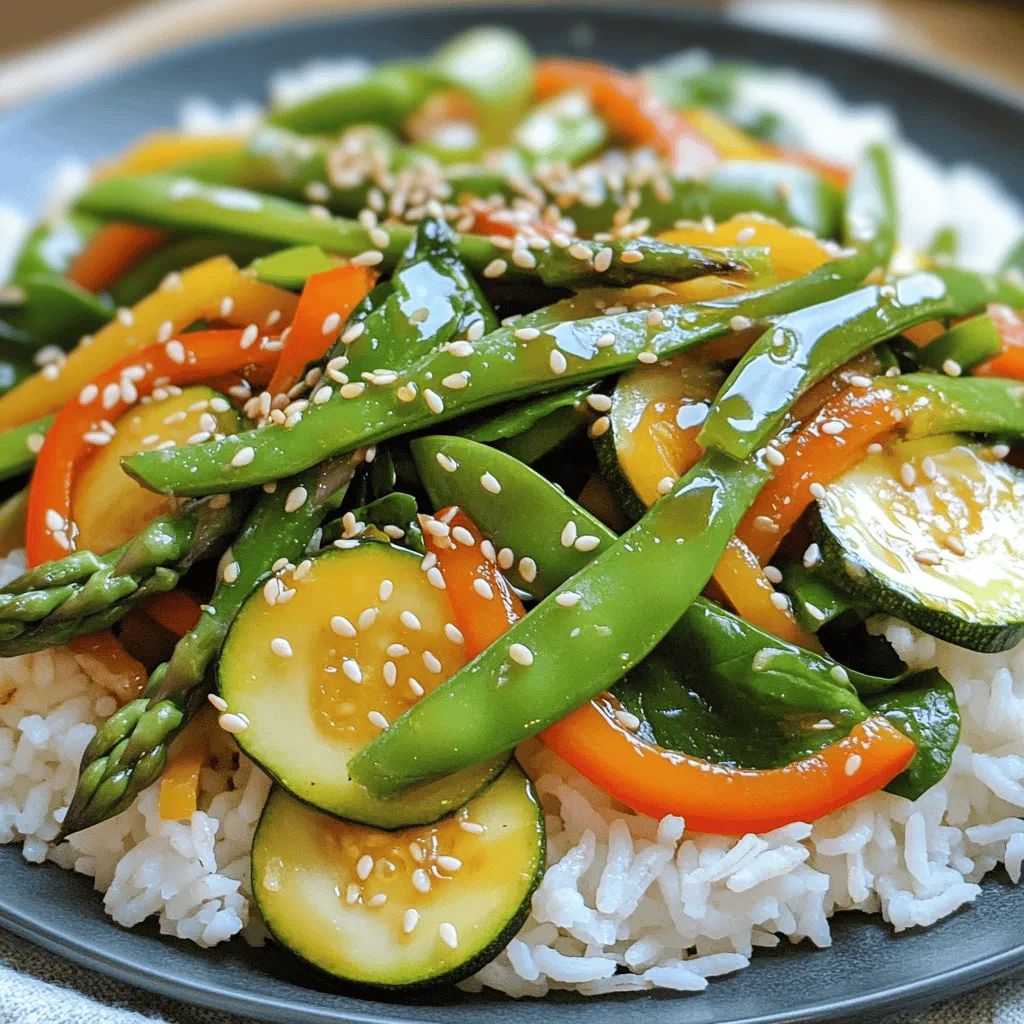
Variations
Alternative Vegetables to Use
You can mix in other fresh veggies for fun. Try using broccoli, bok choy, or snow peas. These choices bring new textures and flavors. You might also add mushrooms for an earthy taste. Carrots can be swapped for bell peppers if you prefer. Remember, the key is to keep it colorful and fresh.
Protein Additions for a Heartier Dish
To make your stir-fry more filling, add protein. Chicken, beef, or shrimp works well. If you want plant-based options, tofu or tempeh are great choices. Just cube them and cook with the garlic and ginger. This way, they soak up all the flavors. Adding nuts like cashews or almonds can also bring crunch and protein.
Gluten-Free or Vegan Substitutions
If you need to make this dish gluten-free, use tamari instead of soy sauce. It has a similar taste without the gluten. For a vegan option, skip the honey and use maple syrup. You can also try agave syrup for sweetness. These simple swaps keep the dish tasty for everyone. For the protein, focus on legumes like chickpeas or lentils. They add nutrition and are very filling.
Storage Info
How to Store Leftovers Properly
After enjoying your spring vegetable stir-fry, let any leftovers cool. Store them in a clean, airtight container. This keeps the flavors fresh and prevents odors. You can place them in the fridge for up to three days. Make sure to label the container with the date. This way, you won’t forget when you made it!
Reheating Tips to Maintain Freshness
When you are ready to eat your leftovers, reheating is key. Use a skillet or wok on low heat. Add a splash of water or soy sauce to keep the veggies moist. Stir them gently until warm. This helps maintain their crunch. You can also use a microwave if you need to be quick. Just cover the bowl to keep moisture in.
Freezing Options for Longer Storage
If you want to keep your stir-fry longer, freezing is a good choice. First, let it cool completely. Then transfer it to a freezer-safe container. You can also use freezer bags for easier storage. Squeeze out as much air as possible. This way, the flavors stay locked in. It can last up to three months in the freezer. When you want to eat it, thaw it in the fridge overnight before reheating. Enjoy your delicious meal whenever you like!
FAQs
What is the best way to cut vegetables for stir-frying?
Cutting vegetables properly makes a big difference. First, aim for even sizes. This helps them cook at the same rate. For stir-frying, cut vegetables into bite-sized pieces. Thin strips or small chunks work best. This method allows for quick cooking and a better texture. For example, slice bell peppers and zucchini into thin strips. Julienne carrots for a nice crunch.
Can I use frozen vegetables for this stir-fry?
Yes, you can use frozen vegetables in this stir-fry. They save time and still taste good. Just remember to thaw them slightly before cooking. This helps avoid excess water in the dish. If you use frozen veggies, toss them in right after the garlic and ginger. Cook them for a few extra minutes until they are heated through.
How do I make this dish more flavor-packed?
To amp up the flavor of your stir-fry, add more seasonings. You can include different sauces like oyster sauce or chili paste. Fresh herbs, like basil or cilantro, add a nice touch too. A squeeze of lime juice can brighten the dish. Experimenting with these options will make your stir-fry even better.
In this post, we explored how to make a tasty stir-fry. We covered fresh spring veggies, essential oils, and sweeteners. You learned step-by-step instructions to prepare and serve your dish. Tips on cooking technique and flavor boosters made it easy. We also discussed fun variations and helpful storage tips.
Remember, a good stir-fry is all about balance and freshness. Enjoy experimenting with different flavors!
